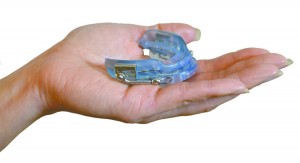Dr. Kevin Brooks – Cosmetic & Family Dentistry
 A good night’s sleep has the power to restore the body and enliven the mind. For the 18 million Americans who experience symptoms of sleep apnea, a good night’s sleep also has the power to save their lives. Obstructive sleep apnea is a serious, life-threatening disorder that is characterized as a series of episodes in which a person stops breathing for 10 seconds or longer during sleep.
A good night’s sleep has the power to restore the body and enliven the mind. For the 18 million Americans who experience symptoms of sleep apnea, a good night’s sleep also has the power to save their lives. Obstructive sleep apnea is a serious, life-threatening disorder that is characterized as a series of episodes in which a person stops breathing for 10 seconds or longer during sleep.
So, how would someone know if he or she had sleep apnea? Snoring is a major indicator, but not all symptoms are so obvious—and audible. A dentist can detect the less evident symptoms of sleep apnea through a candid conversation with a patient, in conjunction with an exam, about the patient’s recent pains or discomforts. A dentist may suspect a patient suffers from sleep apnea if the patient complains about lethargy, morning headaches, or dry mouth (typically caused by open mouth breathing during sleep).
People with sleep apnea usually do not remember waking up during the night. Indications of the problem may include:
• Morning headaches
• Excessive daytime sleepiness
• Irritability and impaired mental or emotional functioning
• Excessive snoring, choking, or gasping during sleep
• Insomnia
• Awakening with a dry mouth or sore throat
Risk factors associated with sleep apnea include the following:
• Physical abnormality in the nose, throat or other parts of the upper airway
• Obesity
• High blood pressure
• Smoking, which can cause inflammation, swelling and narrowing of the upper airway
• Use of alcohol or sedatives and sleep medications
How can my dentist help?
Dentists are often the first professional to become aware of a potential problem since they are usually in contact with their patients more frequently than are physicians. Dentists will send patients with symptoms of sleep apnea to a sleep medicine specialist who will assess the patient’s conditions. If a patient is diagnosed with the disorder, he or she may return to the dentist to receive treatment.
Treatment options for sleep apnea vary depending on the severity of the disorder. An individual with mild sleep apnea may need to make behavioral changes such as altering the sleeping position, losing weight, or quitting smoking, as well as wearing a dental appliance during sleep.
Most dental appliances are acrylic and fit inside your mouths like an athletic mouth guard. Other devices such as the mandibular repositioning device and the tongue retaining device are worn over the head and chin, which helps adjust the position of your jaw and tongue so that your airways remain open. When using these dental devices, it’s important to consult a dentist who specializes in sleep apnea and have the equipment properly fitted. There are other things you can do every day to minimize sleep apnea, including avoiding smoking, alcohol, heavy meals, caffeine, keeping regular sleeping hours and sleeping on your side.
Most dentists have undergone special training for the treatment of sleep apnea and are very skilled in its management using behavioral modification and dental appliances, but a confirmed diagnosis from a sleep medicine specialist is required before any treatment can be administered. Because sleep apnea can be a silent condition, it can go undiagnosed for many years. It is important to keep an open and honest dialog with health care professionals to ensure that conditions such as sleep apnea can be identified and properly treated.
If you or your loved one has any of the symptoms or risk factors for sleep apnea, talk with the dentist at your next appointment to determine if an oral appliance would be beneficial.
Kevin G. Brooks, DMD
125 Marion Oaks Blvd, Ocala, Fl 34473
(352) 347-2333
www.drkevinbrooks.com
Check Also
Why Choose Stem Cell Therapy?
By Trevor Ferguson, DC Of the available Non-Surgical Pain Relief Therapy procedures, stem cell therapy …
 Central Florida Health and Wellness Magazine Health and Wellness Articles of the Villages
Central Florida Health and Wellness Magazine Health and Wellness Articles of the Villages



